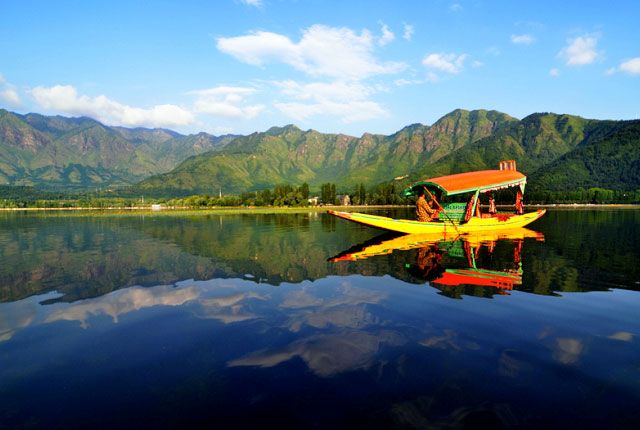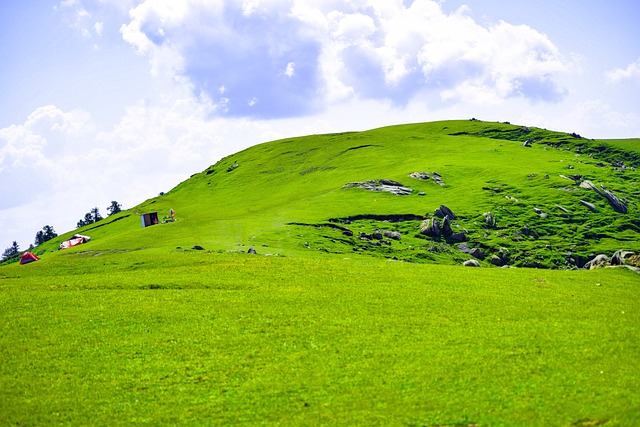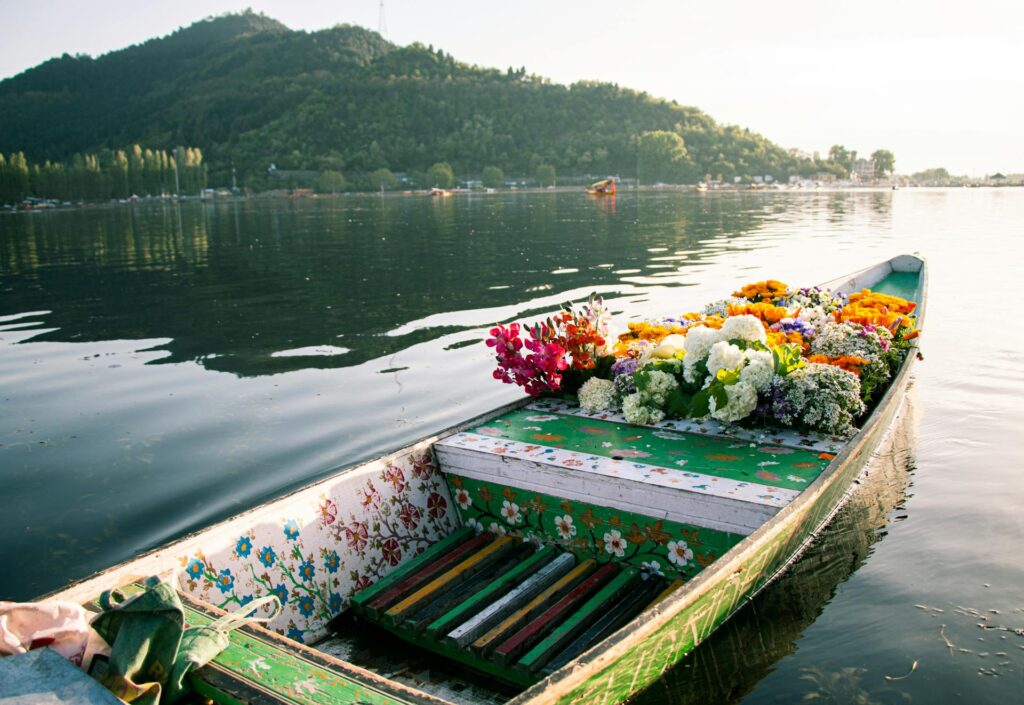
Things to Buy in Kashmir
Table of Contents
ToggleOverview
The place is also termed the “Paradise on Earth”; it is loved and appreciated not just for its magnificent landscapes, high snow-covered mountains, peaceful lakes, and succulent gardens, but people appreciate the richness in cultural heritage as well as exclusive handicrafts of this place. Be it the tour of scenic beauty or the exploration of traditional art forms of this land, Kashmir provides a unique shopping experience from souvenirs and artifacts by reflecting history, art, and natural resources that this land offers.
Things to buy in Kashmir range from intricate textiles to beautifully hand-carved walnut wood, mouth-watering saffron, and even aromatic tea. The items on the list, as varied as the region, will find everything you are seeking to buy or take home when visiting this gorgeous valley. This detailed guide has been made available to you, helping to delve into the most iconic, authentic, and meaningful items that this region of Kashmir has in store for you.
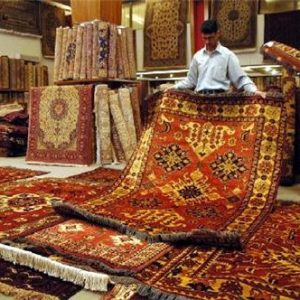
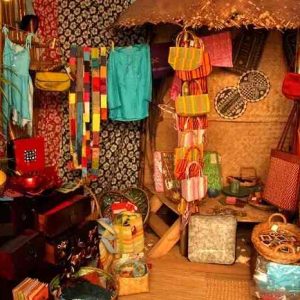
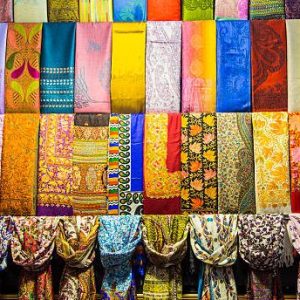
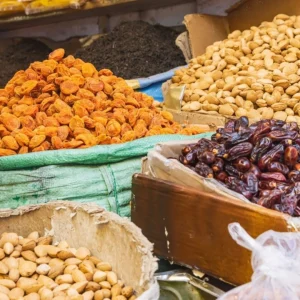
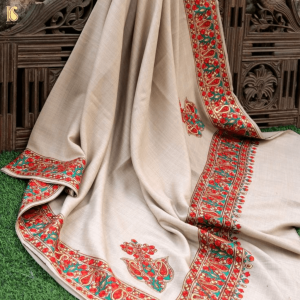
1. Kashmiri Pashmina Shawls - Paragon of Luxury and Quality
It cannot be said to be a proper Kashmir trip unless one buys pashmina woolen shawl, one of the most pricey things you buy in the area. The term “pashmina” was derived from the Persian word “pashm.” It is described as the very fine wool created by the goat that lives high up in the Himalayas in areas of heavy snowfall and frost. What makes pashmina an unusual material for the making of scarves, shawls, and stoles is its extremely soft and lightweight quality, added with warmth.
Why Buy It?
There is unmatched warmth and beauty to these pashmina shawls. They have created floral patterns, paisleys, and nature-inspired motifs all handwoven by talented artisans. A precious true pashmina shawl can be gifted for generations. Shawls can also be dressed as a statement piece of clothing or as a beautiful accessorized attire for any occasion.
Where to Buy?
You can find real pashmina shawls at Lal Chowk, Moti Bazaar, and Kashmir Government Handicraft Emporium in Srinagar. You will come across many stores here, but make sure that the product you purchase is a real pashmina and not synthetic. So, always be on the lookout for 100% pashmina wool in your purchase. Here are some tips for you:
- Feel the softness of the pashmina. The original one will feel very soft and warm to the touch.
- Look for the fine craftsmanship and intricate detailing of embroidery.
- While buying in bulk, ask for a certificate of authenticity that will ensure you buy the real pashmina.
2. Kashmiri Carpets: A Touch of Tradition and Elegance
These rugs, therefore, are probably the most popular in the world, famous for their richness in colours, intricate designs, and unparalleled quality. These are hand-woven from wool and silk, very often decorated with floral patterns, geometric designs, and Persian-inspired motifs. Kashmiri carpets bring together the best of Persian and Mughal styles with a certain unique touch of the region.
What’s in it for me?
These rugs not only decorate but are regarded as a form of investment. The finer art and exquisite materials will last a Kashmiri carpet for ages. Bukhara, Tree of Life, and Paisley, especially are hot items for many collectors.
Where to Buy?
You will come across several forms of Kashmiri Carpets in Srinagar and the rest of Kashmir. The best places to purchase Kashmiri Carpet are at Kashmir Handicrafts Emporium and local carpet showrooms close to Dal Lake and Lal Chowk.
How to Purchase
- Look for the density of the weave. Quality carpet will have a dense and tight weave.
- Ask for a certificate stating that it is handwoven.
- Be ready to bargain since, in the markets of Kashmir, it is quite common.
3. Kashmiri Saffron: The World's Finest Spice
Kashmiri saffron is considered the world’s finest spice owing to its colour, fragrance, and flavor. It is mostly grown in Pulwama district in Kashmir, hand-harvested and hence rare as well as pricey.
Why Buy It?
Kashmiri saffron is prized not only for its food value but also for health values. Kashmiri saffron is used to prepare the food items, Kahwa, which is a type of traditional tea, and Gushtaba, which is a meat preparation. In addition to being used for culinary purposes, it has medicinal properties also, which helps in curing many diseases by virtue of its anti-inflammatory and antioxidant properties. Moreover, it has been proved to enhance the skin tone and boost the mood.
Where to Buy?
Authentic saffron is available in Pulwama, Budgam, and Srinagar. Approach vendors who sell only saffron and are known for its quality. Saffron is also available at local markets or government emporiums selling handicrafts.
How to Buy?
Search for deep red strands of saffron. Saffron with bright red color has a better quality.
- Pure saffron has typical smell and taste is a little bitter. Observe the aroma to know quality.
- Do not use very dry or artificially coloured saffron.
4. Kashmiri Paper-Mâché: Colorful Handicraft with a History
Paper-mâché is an extremely ancient Kashmiri craft in which pieces are created and painted in various colors with the help of paper and other natural materials mixed as a paste. Such items generally feature intricate floral patterns, geometrical designs, and historical motifs inspired by Persian and Mughal art.
Why Buy It?
Paper-mâché from Kashmir is very light and very durable, with beautiful decorations in the form of boxes, bowls, trays, wall hangings, vases, and masks. This art form is over a hundred years old, so buying these paper-mâché products would essentially mean that you are taking home a part of Kashmir’s rich cultural heritage.
Where to Buy?
You can buy Kashmiri paper-mâché products in Srinagar. These are always readily available in the markets alongside Lal Chowk and Dal Lake. The best is, of course, the Kashmir Handicraft Emporium which sells the full range of original products.
Tips for Buying
- Look for hand-painted items with fine detailing and bright colors.
- Make sure that the paper-mâché products are strong and sturdy well-made since some low-quality items may break easily.
- Haggle to achieve the best price since these are mostly overpriced in tourist areas.
5. Kashmiri Silverware: Intricate Jewelry and Artifacts
Silverwork forms part of the local handicrafts of Kashmir. The artisans of this region have been producing Kashmiri silver jewelry, bowls, trays, and utensils since the ages gone by. The silverware mainly comprises delicate intricate engravings and floral motifs aside from reflecting the rich cultural heritage of Kashmir.
Why Buy It?
Kashmiri silver is not only expensive because of its beauty and design but also because of its durability. Some examples of beautiful pieces include silver necklaces, earrings, bracelets, and rings as accessories. Silver artifacts, including bowls, serving trays, and candle holders, add an elegant touch to any home.
Where to Buy?
Silverware can also be purchased at the local market in Srinagar, for instance, in Lal Chowk and Rajbagh, apart from silver shops specializing in these pieces. There is also a trusted source from the Kashmir Handicrafts Emporium.
Tips in Buying
- Examine the engraving to determine whether it is readable and intricately done.
- Ask for a certificate for authenticity in order to be sure of the grade of the silver.
- Compare the prices at different shops so that one doesn’t pay more than what it should cost.
6. Kashmir Walnut Wood Products: Unique Carvings and Furnishings
Kashmir walnut wood is famous for its beauty and hardness, which makes it the best wood to carve intricate designs within the furniture, home decor items, and jewelry boxes. The fine-grain walnut wood used in Kashmir is ideal for wooden sculptures, frames, tables, and statues.
Why Buy It?
This craft is absolutely renowned in walnut wood products that really give a presentation on brilliant mastery. Its woods remain rather long-lived with the brown, natural enriching home furnish coloration adding to richness within. For instances where a desire lies either with some smallish box or sizeable furniture entity, Kashmiri walnut wood production presents just items in an exemplary timeless elegance.
Where to shop?
You can get walnut wood from local markets of Srinagar; prefer Lal Chowk and Shahr-e-Khaas. For more extended items, such as furniture, visit Kashmir Handicraft Emporium or smaller, regional workshops.
Buyer’s Guide
- Quality carving should be well-detailed.
- The wood must be very well-polished with no cracks or other blemishes.
- Whether the product is really authentic as per the provided characteristics of being made of pure walnut wood.
7. Kashmiri Tea and Spices: The Flavor of Kashmir in a Mug
Kashmir is known for some of the unique tea blends and spices used in its cuisine. The worldwide famous aromatic flavors of noon chai, or salty pink tea, and Kahwa, spiced green tea, come from this region. Kashmiri spices are aromatic too, with cardamom, cinnamon, and cloves.
Why Buy?
Kashmiri teas and spices bring home a slice of the place. The Kashmiri saffron tea, Kahwa will carry the aromatic flavor of the region to your kitchen. And that depth and richness these spices add in the dishes as well as warming soothing experience this tea provides end.
You can get it in local markets, such as Lal Chowk, and shops specializing in spices and herbal teas. It’s also available in a gift package as a set with Kahwa tea in many stores.
How to Buy
- Shop for freshly ground spices and pure tea blends
- Ensure that it has a very pungent aroma and colorful appearance that will establish freshness.
- Locally sourced, additive-free traditional blends.
Last minute shopping tips:
- Haggle wisely: Market prices are very often negotiable. Do not hesitate to negotiate a little more.
- Verify authenticity: Buy original stuff, especially pashmina and silverware
- Pack carefully: Be extra careful with the packaging of items like Kashmiri carpets and paper-mâché items as they might break easily while being transported.
Having these tips in mind, you are all set to shop your way to some of the most beautiful, meaningful mementos from one of the world’s most magical places.
Conclusion: Bringing Kashmir Home
There are so many unique things to bring back home from Kashmir, which carry the artistry, culture, and traditions of this beautiful region. Luxurious pashmina shawls, intricately woven carpets, vibrant paper-mâché crafts, and fragrant Kashmiri tea – each product sold from Kashmir is not just a souvenir but a part of the region’s soul.
When shopping in Kashmir, you must look out for authenticity and craftsmanship. Spend time visiting local markets, talk to artisans, and understand the rich history that lies behind every product. It could be a hand-carved walnut product or a silver artifact-you will always take back something of Kashmir’s cultural legacy for years to come.
How to book Kashmir tour?
Contact a travel agency that specializes in Kashmir tours. You can reach out to the following for assistance:
- Phone:
- +91 7889 655596
- +91 7006 891267
- Email:
Inquire about tour packages, itineraries, and pricing, and confirm your booking for a memorable winter experience!
People Also Ask
What are the best souvenirs to buy in Kashmir?
Some of the best souvenirs to buy in Kashmir include pashmina shawls, Kashmiri carpets, saffron, paper-mâché items, silverware, and walnut wood products. These items are unique to the region and reflect the rich cultural heritage of Kashmir.
Where can I buy authentic pashmina shawls in Kashmir?
Authentic pashmina shawls can be found in markets like Lal Chowk, Moti Bazaar, and at the Kashmir Government Handicraft Emporium in Srinagar. It’s important to verify the authenticity of the shawl before purchasing.
What is the significance of Kashmiri carpets?
Kashmiri carpets are renowned for their intricate designs and high quality. They are a blend of Persian and Mughal influences, often featuring floral and geometric patterns. These carpets are highly valued as decorative pieces and long-lasting investments.
Is Kashmiri saffron really special?
Yes, Kashmiri saffron is known for its vibrant red color, rich aroma, and superior flavor. Grown in the Pulwama district, it is considered one of the best quality saffrons in the world.
How do I differentiate between real and fake pashmina shawls?
To differentiate between real and fake pashmina, check for softness and warmth, as genuine pashmina is incredibly soft and lightweight. You can also do the burn test, where real pashmina burns slowly and leaves behind fine ash.
Where can I buy Kashmiri paper-mâché products?
Kashmiri paper-mâché items can be found in local markets such as Lal Chowk and Dal Lake. You can also visit the Kashmir Handicraft Emporium for a wide variety of handcrafted paper-mâché products.
What is the best place to buy Kashmiri silver jewelry?
Kashmiri silver jewelry is available in local markets like Lal Chowk, Rajbagh, and at specialized silver shops in Srinagar. The Kashmir Handicraft Emporium is also a reliable place for purchasing authentic silverware.
Are Kashmiri carpets worth the investment?
Yes, Kashmiri carpets are worth the investment due to their timeless beauty, durability, and craftsmanship. Handwoven carpets can last for generations and often increase in value over time.
What types of spices are unique to Kashmir?
Some spices unique to Kashmir include cardamom, cloves, cinnamon, and Kashmiri dried ginger. These spices add a distinct flavor to Kashmiri cuisine and are excellent for cooking and gifting.
Can I buy Kashmiri walnut wood furniture?
Yes, Kashmiri walnut wood products like furniture, frames, and sculptures are available for purchase. These items are highly valued for their intricate craftsmanship and durability.
What is the best way to store Kashmiri saffron?
To store Kashmiri saffron, keep it in an airtight container in a cool, dark place. This helps maintain its flavor and aroma for a longer time.
How do I ensure I’m buying genuine Kashmiri products?
Ensure authenticity by buying from reputable shops or government-run handicraft emporiums. Ask for certificates of authenticity for pashmina and Kashmiri carpets to confirm the quality.
Can I find Kashmiri handicrafts online?
Yes, many reputable online platforms offer Kashmiri handicrafts such as pashmina shawls, Kashmiri carpets, and walnut wood products. Always check reviews and authenticity before purchasing online.
Is bargaining common when shopping in Kashmir?
Yes, bargaining is common in Kashmir, especially in local markets. It’s advisable to negotiate prices for items such as silverware and carpets to get a better deal.
What makes Kashmiri tea different from other teas?
Kashmiri tea, like noon chai (salty pink tea) and Kahwa, is unique due to its use of spices like cardamom, cinnamon, and saffron, giving it a rich, aromatic flavor.
What should I look for when buying Kashmiri carpets?
When buying Kashmiri carpets, look for dense weaving, fine detailing, and high-quality wool or silk. A high-quality carpet will have intricate designs and feel durable to the touch.
How long does a Kashmiri pashmina shawl last?
A genuine pashmina shawl can last for many years with proper care. It should be washed gently by hand or dry-cleaned to maintain its softness and appearance over time.
Can I buy Kashmiri tea and spices as gifts?
Yes, Kashmiri tea and spices make excellent gifts. The Kashmiri Kahwa tea set and aromatic saffron are both thoughtful and unique gifts that reflect the region’s rich culinary culture.
What is the best way to clean Kashmiri carpets?
Kashmiri carpets should be cleaned using a professional carpet cleaning service to preserve their colors and textures. Avoid using harsh chemicals that could damage the delicate fibers.
Is Kashmir a good place to shop for luxury items?
Yes, Kashmir is a great place to shop for luxury items like pashmina shawls, Kashmiri carpets, and silverware. These items are handcrafted and often represent the highest quality and craftsmanship.
What are some other popular handicrafts from Kashmir?
Other popular handicrafts from Kashmir include Kashmiri papier-mâché, Kashmiri leather products, Kashmiri silk, and Kashmiri embroidery.
Where can I buy authentic Kashmiri walnut wood products?
Authentic walnut wood products are available in Srinagar markets such as Lal Chowk, Rajbagh, and at the Kashmir Handicraft Emporium.
Is it safe to buy Kashmiri products from online platforms?
Yes, but ensure that you purchase from trusted websites and platforms that provide guarantees of authenticity and customer reviews. Look for certifications of origin for products like pashmina or carpets.
What are some traditional Kashmiri items to bring back as gifts?
Traditional Kashmiri items such as pashmina shawls, handwoven carpets, Kashmiri saffron, and paper-mâché trinkets make for unique and meaningful gifts for friends and family.
What are the most common patterns in Kashmiri carpets?
Some common patterns in Kashmiri carpets include Paisley, Bukhara, Tree of Life, and floral designs, which are influenced by Persian and Mughal art.
Are there any seasonal sales for Kashmiri handicrafts?
Yes, there may be seasonal sales or discounts on Kashmiri handicrafts during festivals like Eid and Diwali, or during local events. Be sure to check with local stores for any promotions.
What makes Kashmiri papier-mâché unique?
Kashmiri papier-mâché is famous for its vibrant, intricate hand-painted designs, usually showcasing floral patterns, animals, and geometric shapes. The process of crafting and decorating is a centuries-old tradition in the region.
How can I ensure I’m buying high-quality Kashmiri saffron?
To buy high-quality Kashmiri saffron, look for long, deep red strands and a strong aroma. Authentic saffron should not be overly dry or have an orange or yellow hue.
How much does a Kashmiri pashmina shawl cost?
The cost of a Kashmiri pashmina shawl can vary widely based on the quality, craftsmanship, and design. Prices generally range from a few thousand to several lakhs, depending on whether it’s pure pashmina or a blend.
Are Kashmiri handicrafts eco-friendly?
Yes, most Kashmiri handicrafts are made using natural materials like wool, wood, and cotton, making them environmentally friendly. Additionally, many of the items are handmade, supporting traditional, sustainable craftsmanship.



